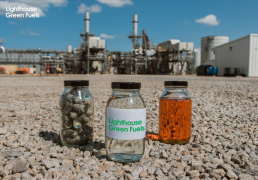In the ever-evolving realm of aviation, sustainability has taken centre stage, prompting a revolutionary shift in the way we approach fuel. At Alfanar Projects we proudly champion this movement towards a greener future, leading the way through transparency and innovative solutions. Let’s dive into the pivotal differences between Sustainable Aviation Fuel (SAF) and traditional fossil fuels, exploring their production, composition, and environmental impact.
As aviation fuel undergoes a paradigm shift, understanding the essence of this change begins with production processes. Conventional jet fuels have long been the backbone of the industry, derived from finite fossil resources. However, #SAF offers a departure from this reliance, embracing abundant renewable feedstocks like municipal solid waste, waste oils or forestry residues. This shift not only diversifies our fuel sources but also aligns with the aviation sector’s commitment to reducing its environmental footprint.
The composition of aviation fuel plays a crucial role in shaping its impact on the environment. By prioritising sustainable feedstocks and leveraging advanced refining processes, SAF stands out with a cleaner composition and delivers a greener alternative without compromising performance. This nuanced understanding of composition is key for businesses seeking to make sustainable choices in their fuel procurement.
Moving beyond composition, the environmental impact of aviation fuels extends to factors such as particulate matter emissions and overall air quality. SAF excels in this arena, significantly lowering greenhouse gas emissions throughout its lifecycle. The production and use of SAF not only contribute to reduced carbon footprints but also enhance overall air quality, making it a responsible choice for businesses committed to minimising their environmental impact. Replacing fossil fuels with SAF (without the use of carbon capture technologies enhancing this figure even further) offers up to 80% emissions savings compared to the use of conventional jet fuel. This is achieved by reusing carbon that has already been present in the feedstock’s lifecycle, instead of generating additional CO2 into the atmosphere.
We stand as pioneers in the production of advanced sustainable fuel at commercial scale, contributing 10% to the UK’s overall Jet Zero strategy 2030 target. Lighthouse Green Fuels is set to become Europe’s largest advanced #waste-to-SAF facility, saving over 750,000 tonnes of #CO2 emissions annually once commercial operation starts. Our commitment to transparency ensures that our clients have access to comprehensive information about the origin, composition, and environmental performance of the aviation fuels we provide. By embracing innovative solutions, we empower businesses to make informed decisions that align with their sustainability goals.
In conclusion, the aviation industry is at a crossroads, and the choice between traditional fossil fuels and SAF is pivotal. With a deep understanding of the nuanced differences in production processes, composition, and environmental impact, businesses can confidently navigate this transition. Join us in charting the course towards an aviation industry that embraces the principles of environmental responsibility and technology innovation – and, as a result, creates a sky that is undeniably greener and more sustainable.
